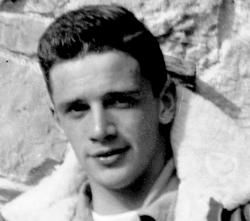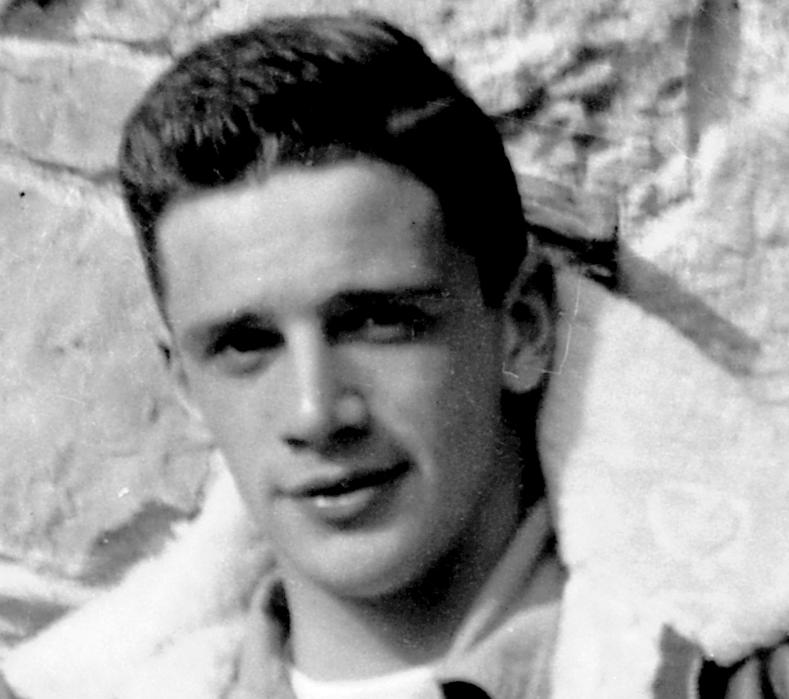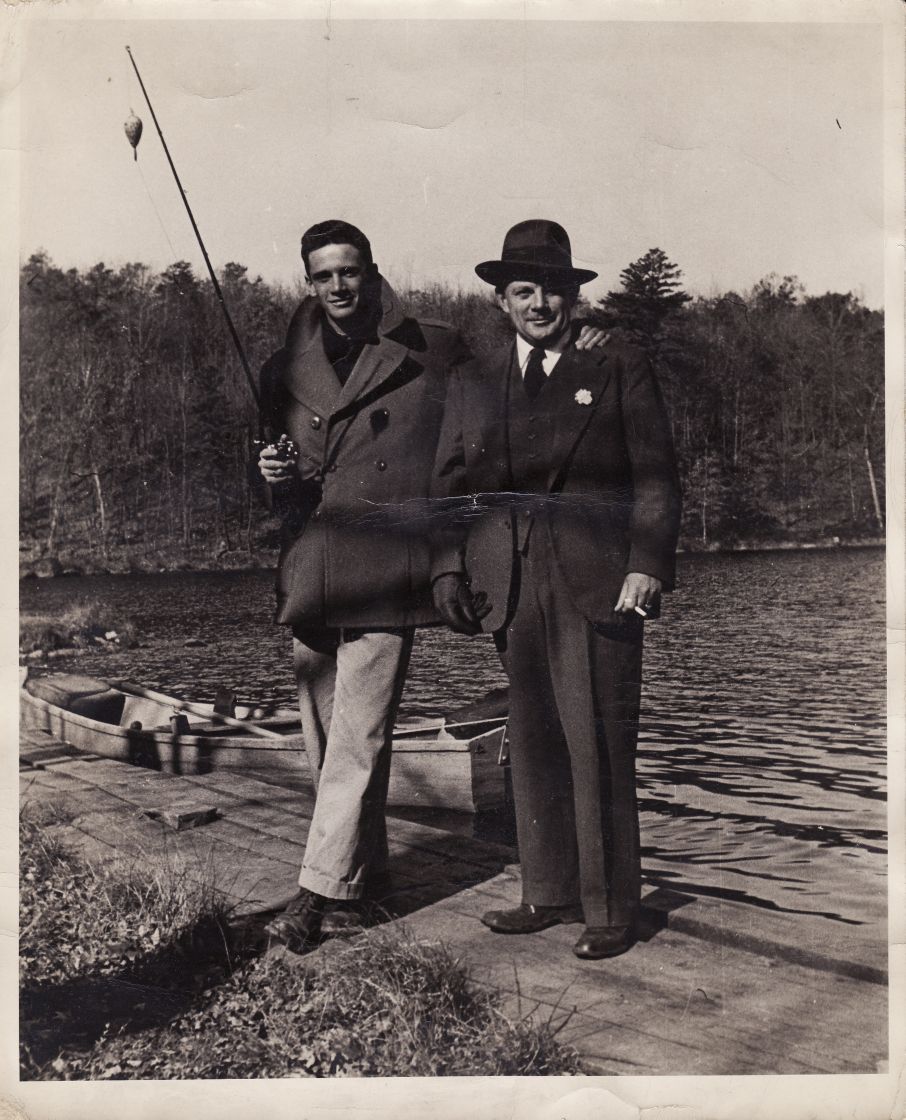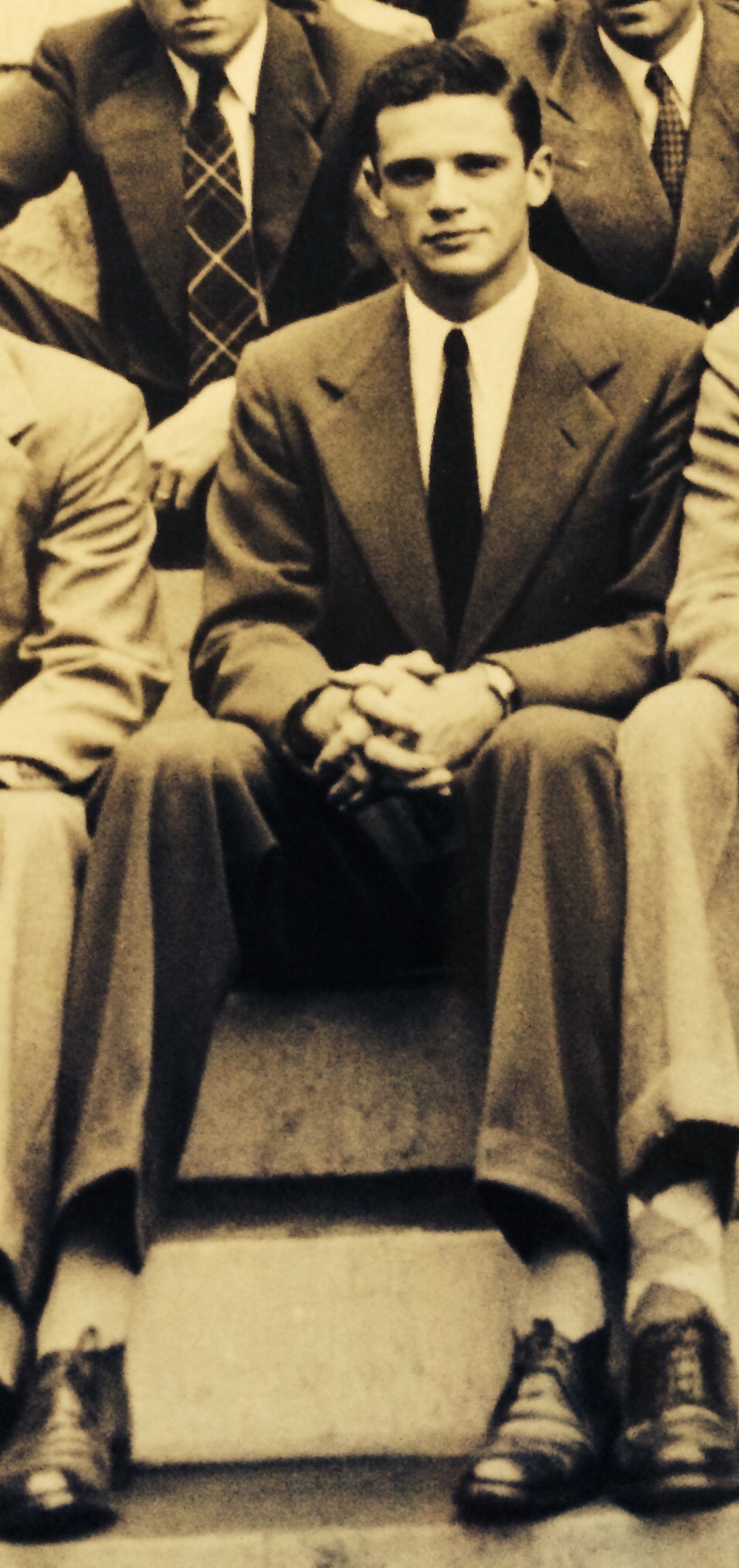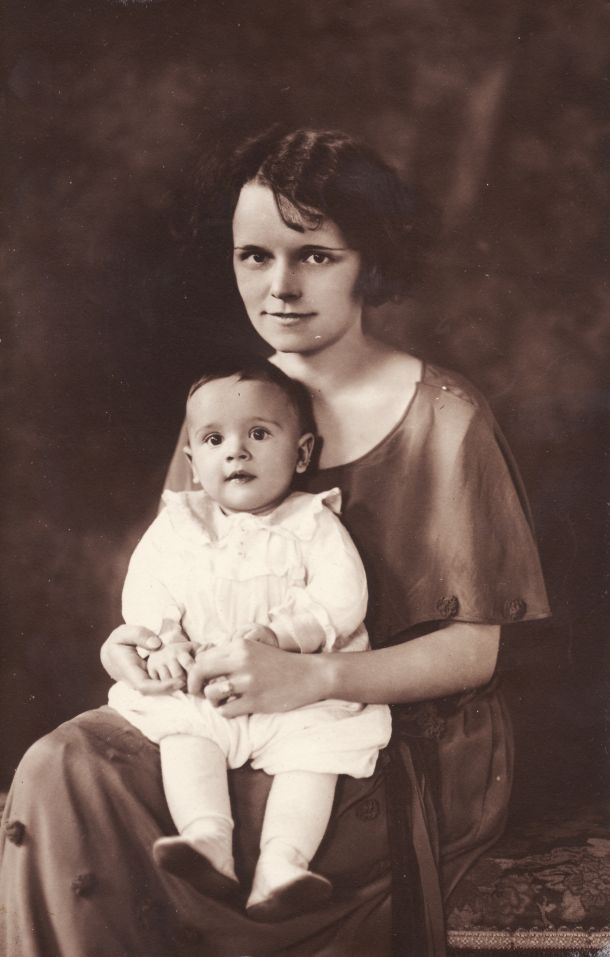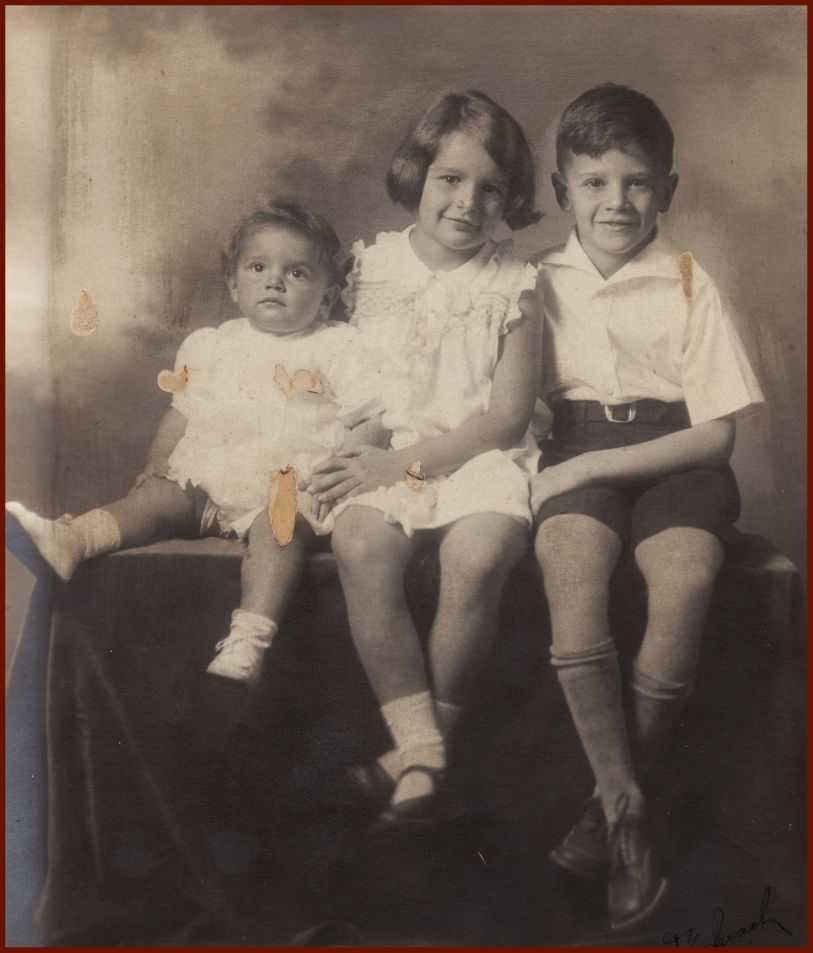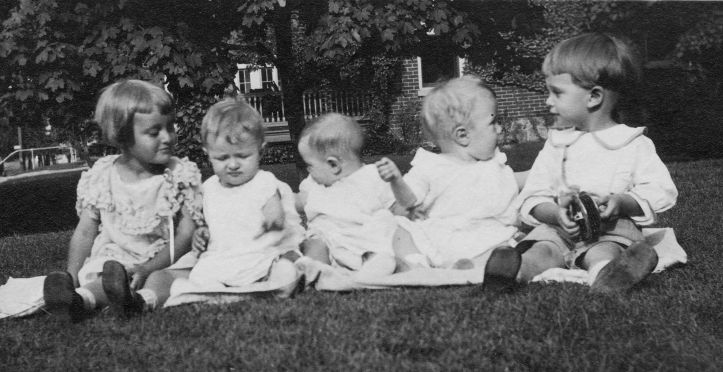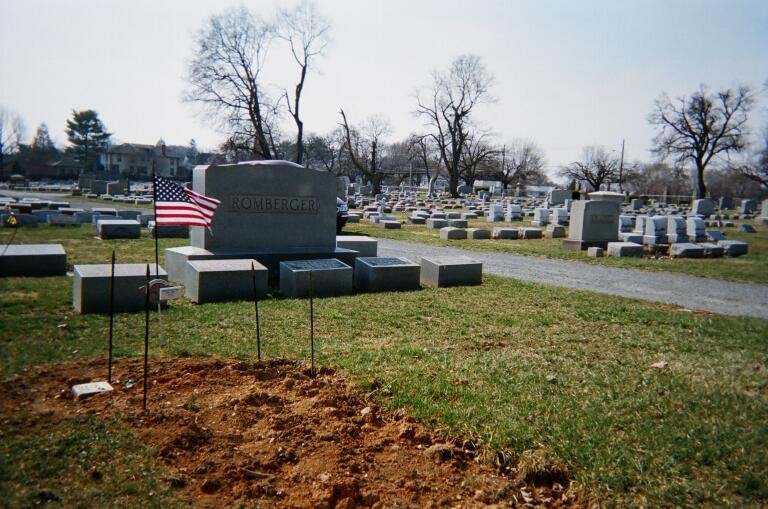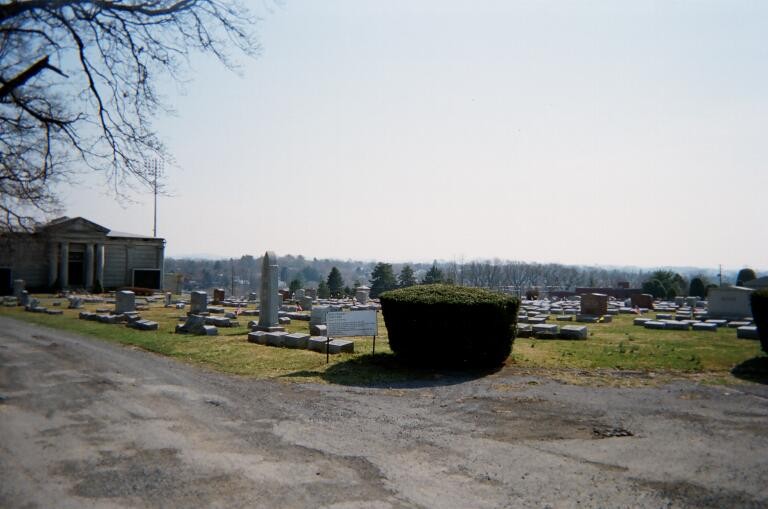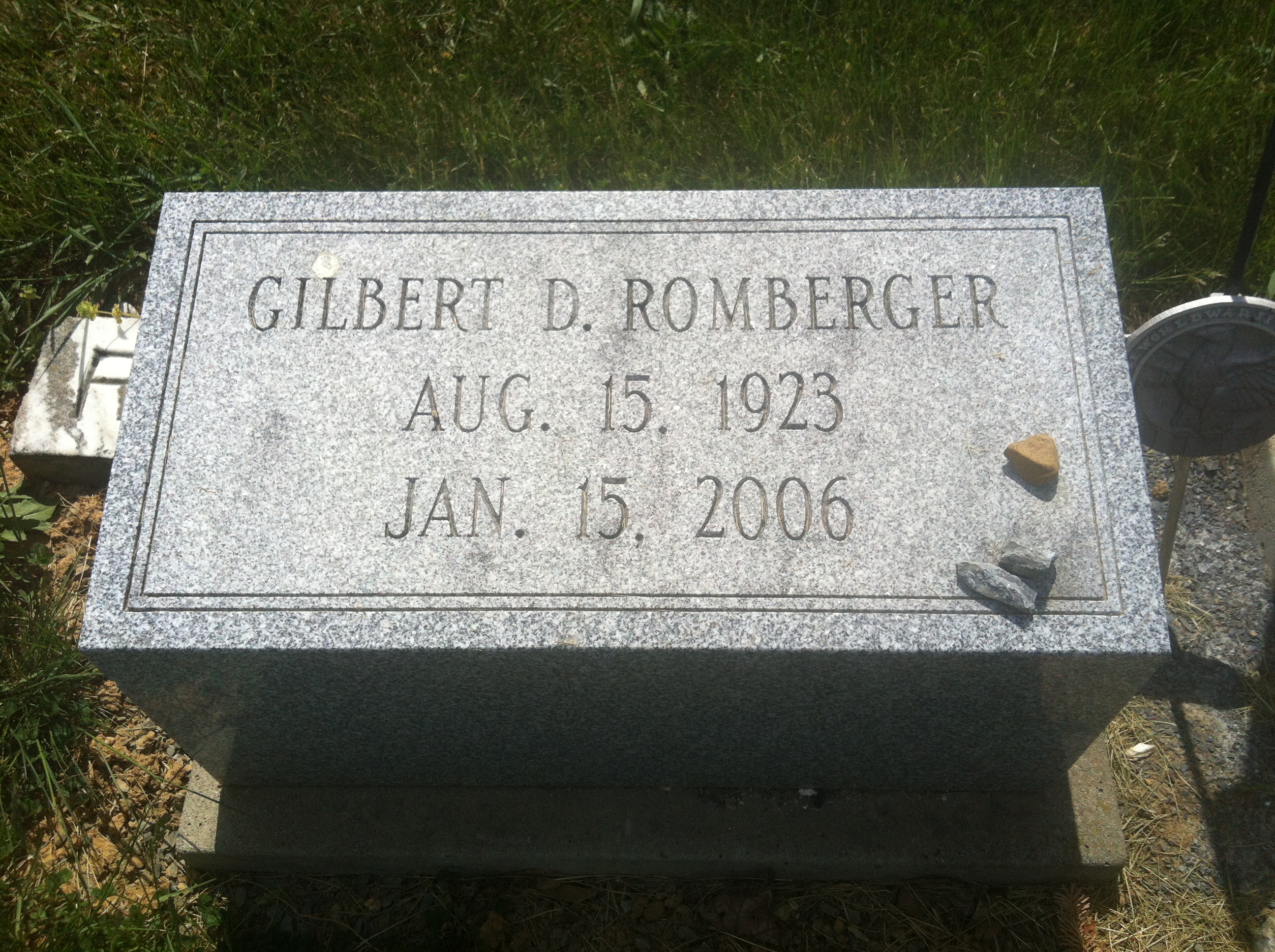Dad had been trained by the Army Air Corps in Morse code. It tickled my funnybone no end when he would rattle stuff off rapidly with "dahs" and "dits". I never got the hang of it myself, but loved to hear it. The only phrase I could remember was "di di dit, dah dah dah, di di dit" ("· · · — — — · · ·") for "SOS".
(Below his obituary is the eulogy delivered at my father's memorial service.)
_____________________________________
Of all the properties which belong to honorable men, not one is so highly prized as that of character.
--Henry Clay
A little nonsense now and then is relished by the wisest men.
-- quote used to describe Dad in his high school yearbook, attributed to Anonymous
ღ
I really miss my dad. It's not easy to say how much he meant to me without getting choked up. He was all a father should be, and he never lost sight of that responsibility.
It's truly not an exaggeration to say that everyone who knew him loved my dad, because he always had a kind word for others, and tried to put the comfort and happiness of others first. My dad was interested in you so he knew how to ask questions to engage you, how to tell a good story, and loved to tease and make others laugh.
For all his joking around, he was a sober planner who was prudent with a buck, who kept a sharp yard and home, and who was the one who visited and helped family members who needed it. Dad had a love of, and respect for nature. He set me an excellent example with his fine character and wit, at least some of which I pray I carry.
My father was his family's rock; he looked out for everyone. Not just mom and me, but his widowed grandma, his sisters and their families. He was the one who found both his father and sister passed away in their homes. When he knew someone was having a hard time, he made himself available to them. How many hours did I hear him on the phone with a troubled lonely friend going through a messy divorce? How many times did he stop by to check in on neighbors? My father understood duty, but it was borne out of his deep sense of compassion. He had known hard times himself, and he wanted to make your way easier.
My dad especially loved frogs, chocolate, jazz, ice cream and hawks, and could whistle better than anyone I ever heard. I used to request the theme song from The Good, the Bad, and the Ugly. Dad also could imitate and call birds into our yard - much to the surprise or annoyance of those ready to fight or mate.
When I picture my dad in contentment, I see him in the dark on our side porch. He'd often sit there on summer evenings with a cup of iced tea, sometimes after mowing the lawn, and sometimes just because it was nice there, listening to crickets and locusts on the small flagstone porch surrounded for many years by a feathery hedge of blue-green arctic willow. Later when that hedge had gotten a little raggedy, he bought a bundle of privet stalks on sale, planted those, and they grew quickly and looked great. He'd gesture toward it with a smile and say, "You know what that is? That's a 99 cent hedge." It was so like him to celebrate the virtues of thriftiness and appreciation of beauty. I will never forget the night I sat with him there one August when we spoke of the annual meteor showers. Pointing to the right side of our horizon, he said "You know, it's about that time, and usually we see the action right there" - and as he spoke a nice shooting star whizzed by, just as though he'd made it happen.
Another snapshot of my dad feeling blissful: We're out on a lake in our Grumman SportCanoe, a hybrid he loved with a 6 horsepower Johnson on the back. We've just rowed into a small private cove where it's still and quiet, and the only sounds are bees rushing in and out of an empty tree they've made their home, and if we're lucky, we'll see a deer come crashing through. He's opened up the thermal box where the lunch Mom made awaits. He picks some crumbs off a sandwich and throws them overboard and we watch the small fish come to feed. He takes a bite of the ham and cheese, munches on a few grapes, has a swallow of ginger ale and says "What more do you need?"
30104 days was not enough.
I know my dad very well, and am sure he's amazed there's a site like this, amazed and humbly awed people visit and honor him, so on his behalf, thank you.
ღ
Gilbert D. Romberger, 82, of Allentown, died January 15, 2006, in Lehigh Valley Hospital, Salisbury Township. He was the husband of Lucille (Ettinger) Romberger for the past 56 years. He was the son of the late Gilbert Allen Romberger and Fay (Schell Meckley) Romberger. Gil was a graduate of Lehigh University and a member of Delta Upsilon fraternity. He served in World War II as a pilot in the Army Air Corps, attaining the rank of Lieutenant. He was the third-generation family owner of Romberger Cast Stone, South Aubrey Street in east Allentown. He later worked for Kraemer Textiles before retiring in 2002. A lifelong member of Christ Lutheran Church, Allentown, Gil served as a deacon and was church council secretary for many years. Services: Memorial, 11 a.m. Thursday, Christ Lutheran Church, 1245 Hamilton St., Allentown. Contributions: In lieu of flowers, the family requests memorial contributions be sent to Christ Lutheran Church, PA 18102 or to a charity of choice.
ღ
(The core of this eulogy relates to the local people, the so-called "Pennsylvania Dutch" who were truly of German descent. They made up the bulk of the Allentown area population since the 1700's colonial times, though this demographic is changing today. The Pennsylvania Dutch had charming accents, and great simple stories and "dumb Dutchman" humor. Most of the eulogy will be understandable to folks not from the area, though one part needs an explanation. One of the quintessential localisms was an old exchange where the question was asked "Kannst du Mikke fange?" (Can you catch flies?) and the answer is "Ja, vann sie hucke bleibe." (Yes, if they stay still.) The exchange wasn't really about catching flies - if you asked the question, you were really trying to find out if the other fellow spoke Pennsylvania Dutch, or was, in essence, a Dutch brother. Other than that, the local charm is readily understandable.)
Thank you for coming here today for Gilbert Daniel Romberger.
You may know him as your fraternity brother, neighbor, fellow church member, Army Air Corps buddy, classmate, friend or relative. I was blessed to call him "father".
I wish today that I could share with you some amazing lesson or two that I learned from Dad - something that would be interesting for you to listen to, and profound at the same time. I came to the realization that a strong moral sense, an unwavering love of family, and a soul that wanted to lighten the loads of others reflects great constancy, but doesn't make for great stories.
Still, my dad loved stories himself, and embraced his Pennsylvania Dutchness. This was a man who'd go upstairs to take a "shaur", meet you in a "korter of an aur" and who parked his car in the "crotch." He loved his shoo-fly pie and apple dumplings. And yes, he knew the answer to "Kannst du Mikke fange?"
Yes, Dad loved good stories, especially Dutch ones, and I think he would be glad to know the stories he loved to tell would be told today so his mirth could live on in your subsequent re-tellings.
Dad used to tell of an occasion when he was a boy and his grandfather had taken him to Walp's Restaurant. The two of them stood in line waiting for a table when an acquaintance of his grandpa's came out, looking very shaken. "What's wrong?" his grandpa asked of his friend. The friend related that he'd ordered the dried sliced apples and ham dish with dumplings known as "schnitz und knepp", and to his chagrin, had found a fly in his meal. Dad's grandpa asked where the offending insect had been found, to which the fellow replied "Oy, it vas in die Schnitz!"
Another of Dad's favorite tales was of the Dutchie who was pulled over by a cop for some driving offense. While the officer explained the apparent offense and the ticket he was issuing, the Dutch motorist kept brushing his hands through the air near the policeman. Irritated, the cop finally said, "What the heck are you doing?" The driver replied "I'm chust brushing away the circle flies."
"Circle flies?" spat the policeman, "What are you talking about?"
"Vell, officer, those are the flies you see circling around and around the back end of a horse."
The cop continued writing the citation and then suddenly looked up. "Wait a minute, buddy, are you calling me a horse's butt?"
The wide-eyed motorist replied, "Oy, officer, I wouldn't say such a thing, why I wouldn't even think it. But you can't fool those circle flies!"
One last story my dad loved to tell was the tale of the monstrous fire at Buckeye Pipe, the petroleum products company in Emmaus. It was said to be a conflagration of massive proportions that drew firefighters from Emmaus and Allentown and all the surrounding areas. Again and again the firemen approached and were instantly driven back by the danger of serious explosion and the intense heat.
Finally, when all was thought lost, the tiny brigade from Seisholtzville came racing in their lone truck down the mountain and flew right down practically into the blaze. The men jumped out and quickly got their gear and got the fire out in short order.
Weeks later, a ceremony was held where the grateful president of Buckeye Pipe presented the Seisholtzville fire chief with a generous check of thanks, noting "You and your men put yourselves in danger's path, when no one else would even come close. Thank you. What do you think you and your men will do with this money?" The chief replied "Vell, the first thing we're gonna do is get them brakes fixed on the truck."
Always looking to cheer - that was my father. If he brightened your day or had a kind word for you, I think that's how he'd like to be remembered.
As his daughter, I got to see sides of him others might not, but most of all I can be glad of the little enduring things he brought to my consciousness, most of which had to do with humor, and a sense of awe, and an appreciation of nature and beauty. Mental snapshots of my dad include days at Nockamixon or Beltzville on the water, when he'd cut the motor, row us into a shaded cove, let the oars go, and we'd have lunch, tossing bread crumbs to the minnows who would surround our boat in the glistening water. Another snapshot: We are outside somewhere and the birds are singing. My dad, the champion whistler, is listening and whistling back to one bird he has picked out, and is trying to call it in. Another snapshot: It's a late summer night and Dad and I are on the side porch looking at the stars. I say "Isn't it about time for those meteor showers?" He replies "Yes, they'll be right over here" gesturing to his right, just as a shooting star zooms by, as though his say-so caused it to happen.
With Dad's last years peppered with the indignities of age and the limitations they brought, it seems most fitting to leave you with a simple story he told me several times, one that brought him great joy to tell, and tell again.
One year, strange noises coming from the fireplace flue told Dad a bird was stuck in our chimney. After several approaches, Dad positioned a box in the fireplace, opened the flue, and the bird fell into the box, which he quickly closed and took out onto the porch. He opened the box and the bird flew past him, revealing itself to be a mockingbird. It flew to the top of a neighbor's tree, and sang its heart out. Dad admitted being rather choked up. He was unsure if the mockingbird was expressing thanks, but there was no mistaking its joy at being free. And I'd like to think now my Dad has joy at being free as well.
A poem by the name "I'm Free" crossed my path this week, and I'd like to end with it:
Don't grieve for me, for now I'm free
I'm following the path God laid for me.
I took his hand when I heard the call,
I turned my back and left it all.
I could not stay another day
To laugh, to love, to work or play.
Tasks left undone must stay that way
I've found my peace at the close of the day.
If my parting has left a void,
Then fill it with remembered joy.
A friendship shared, a laugh, a kiss,
Oh yes, these things I too will miss.
Be not burdened with times of sorrow
I wish you the sunshine of tomorrow.
My life's been full, I've savored much-
Good friends, good times, a loved one's touch.
Perhaps my time seemed all too brief
Don't lengthen it now with undue grief.
Lift up your heart and share with me-
God wanted me now, he set me free.
ღ
..
.-.. --- ...- .
-.-- --- ..-
-.. .- -..
Special heartfelt thanks to Clinton Hiley for his sponsorship of this page.
Military service history - in progress.
February 12, 1943, inducted during junior year at Lehigh University. It's known he and buddy Ed Schlecter began in the Army, and at some point my father elected to move into the Air Corps.
May 25, 1943 (Morning Call) - Promoted to private first class at Army Air Forces technical school in Sioux Falls, SD where he was in training as a radio operator mechanic.
In the interval between the above note and the next one below, he was transferred to cadet pilot training at Canyon, Texas where he attended the West Texas State Teachers college. He then had further training at Marana Field, Arizona, and Santa Anna, California. I can add that I know he was also sent, at some point, to San Bernardino, California (which was then nicknamed San Berdoo) as well as another air base in the west, Nevada or Arizona. This latter place has since turned the air corps field into a municipal airport where my father had his picture taken many years later.
February 11, 1945 (Morning Call, two years after induction) - Recently graduated from Pilot School, Luke Field, Phoenix, Arizona, where he received his commission as second lieutenant and his pilot's wings.
Three months later the war was effectively over, with the Yalta Conference.
October 1, 1947 (Morning Call) - Having returned to civilian life, he finally receives his B.S. in business administration from Lehigh University.
Dad had been trained by the Army Air Corps in Morse code. It tickled my funnybone no end when he would rattle stuff off rapidly with "dahs" and "dits". I never got the hang of it myself, but loved to hear it. The only phrase I could remember was "di di dit, dah dah dah, di di dit" ("· · · — — — · · ·") for "SOS".
(Below his obituary is the eulogy delivered at my father's memorial service.)
_____________________________________
Of all the properties which belong to honorable men, not one is so highly prized as that of character.
--Henry Clay
A little nonsense now and then is relished by the wisest men.
-- quote used to describe Dad in his high school yearbook, attributed to Anonymous
ღ
I really miss my dad. It's not easy to say how much he meant to me without getting choked up. He was all a father should be, and he never lost sight of that responsibility.
It's truly not an exaggeration to say that everyone who knew him loved my dad, because he always had a kind word for others, and tried to put the comfort and happiness of others first. My dad was interested in you so he knew how to ask questions to engage you, how to tell a good story, and loved to tease and make others laugh.
For all his joking around, he was a sober planner who was prudent with a buck, who kept a sharp yard and home, and who was the one who visited and helped family members who needed it. Dad had a love of, and respect for nature. He set me an excellent example with his fine character and wit, at least some of which I pray I carry.
My father was his family's rock; he looked out for everyone. Not just mom and me, but his widowed grandma, his sisters and their families. He was the one who found both his father and sister passed away in their homes. When he knew someone was having a hard time, he made himself available to them. How many hours did I hear him on the phone with a troubled lonely friend going through a messy divorce? How many times did he stop by to check in on neighbors? My father understood duty, but it was borne out of his deep sense of compassion. He had known hard times himself, and he wanted to make your way easier.
My dad especially loved frogs, chocolate, jazz, ice cream and hawks, and could whistle better than anyone I ever heard. I used to request the theme song from The Good, the Bad, and the Ugly. Dad also could imitate and call birds into our yard - much to the surprise or annoyance of those ready to fight or mate.
When I picture my dad in contentment, I see him in the dark on our side porch. He'd often sit there on summer evenings with a cup of iced tea, sometimes after mowing the lawn, and sometimes just because it was nice there, listening to crickets and locusts on the small flagstone porch surrounded for many years by a feathery hedge of blue-green arctic willow. Later when that hedge had gotten a little raggedy, he bought a bundle of privet stalks on sale, planted those, and they grew quickly and looked great. He'd gesture toward it with a smile and say, "You know what that is? That's a 99 cent hedge." It was so like him to celebrate the virtues of thriftiness and appreciation of beauty. I will never forget the night I sat with him there one August when we spoke of the annual meteor showers. Pointing to the right side of our horizon, he said "You know, it's about that time, and usually we see the action right there" - and as he spoke a nice shooting star whizzed by, just as though he'd made it happen.
Another snapshot of my dad feeling blissful: We're out on a lake in our Grumman SportCanoe, a hybrid he loved with a 6 horsepower Johnson on the back. We've just rowed into a small private cove where it's still and quiet, and the only sounds are bees rushing in and out of an empty tree they've made their home, and if we're lucky, we'll see a deer come crashing through. He's opened up the thermal box where the lunch Mom made awaits. He picks some crumbs off a sandwich and throws them overboard and we watch the small fish come to feed. He takes a bite of the ham and cheese, munches on a few grapes, has a swallow of ginger ale and says "What more do you need?"
30104 days was not enough.
I know my dad very well, and am sure he's amazed there's a site like this, amazed and humbly awed people visit and honor him, so on his behalf, thank you.
ღ
Gilbert D. Romberger, 82, of Allentown, died January 15, 2006, in Lehigh Valley Hospital, Salisbury Township. He was the husband of Lucille (Ettinger) Romberger for the past 56 years. He was the son of the late Gilbert Allen Romberger and Fay (Schell Meckley) Romberger. Gil was a graduate of Lehigh University and a member of Delta Upsilon fraternity. He served in World War II as a pilot in the Army Air Corps, attaining the rank of Lieutenant. He was the third-generation family owner of Romberger Cast Stone, South Aubrey Street in east Allentown. He later worked for Kraemer Textiles before retiring in 2002. A lifelong member of Christ Lutheran Church, Allentown, Gil served as a deacon and was church council secretary for many years. Services: Memorial, 11 a.m. Thursday, Christ Lutheran Church, 1245 Hamilton St., Allentown. Contributions: In lieu of flowers, the family requests memorial contributions be sent to Christ Lutheran Church, PA 18102 or to a charity of choice.
ღ
(The core of this eulogy relates to the local people, the so-called "Pennsylvania Dutch" who were truly of German descent. They made up the bulk of the Allentown area population since the 1700's colonial times, though this demographic is changing today. The Pennsylvania Dutch had charming accents, and great simple stories and "dumb Dutchman" humor. Most of the eulogy will be understandable to folks not from the area, though one part needs an explanation. One of the quintessential localisms was an old exchange where the question was asked "Kannst du Mikke fange?" (Can you catch flies?) and the answer is "Ja, vann sie hucke bleibe." (Yes, if they stay still.) The exchange wasn't really about catching flies - if you asked the question, you were really trying to find out if the other fellow spoke Pennsylvania Dutch, or was, in essence, a Dutch brother. Other than that, the local charm is readily understandable.)
Thank you for coming here today for Gilbert Daniel Romberger.
You may know him as your fraternity brother, neighbor, fellow church member, Army Air Corps buddy, classmate, friend or relative. I was blessed to call him "father".
I wish today that I could share with you some amazing lesson or two that I learned from Dad - something that would be interesting for you to listen to, and profound at the same time. I came to the realization that a strong moral sense, an unwavering love of family, and a soul that wanted to lighten the loads of others reflects great constancy, but doesn't make for great stories.
Still, my dad loved stories himself, and embraced his Pennsylvania Dutchness. This was a man who'd go upstairs to take a "shaur", meet you in a "korter of an aur" and who parked his car in the "crotch." He loved his shoo-fly pie and apple dumplings. And yes, he knew the answer to "Kannst du Mikke fange?"
Yes, Dad loved good stories, especially Dutch ones, and I think he would be glad to know the stories he loved to tell would be told today so his mirth could live on in your subsequent re-tellings.
Dad used to tell of an occasion when he was a boy and his grandfather had taken him to Walp's Restaurant. The two of them stood in line waiting for a table when an acquaintance of his grandpa's came out, looking very shaken. "What's wrong?" his grandpa asked of his friend. The friend related that he'd ordered the dried sliced apples and ham dish with dumplings known as "schnitz und knepp", and to his chagrin, had found a fly in his meal. Dad's grandpa asked where the offending insect had been found, to which the fellow replied "Oy, it vas in die Schnitz!"
Another of Dad's favorite tales was of the Dutchie who was pulled over by a cop for some driving offense. While the officer explained the apparent offense and the ticket he was issuing, the Dutch motorist kept brushing his hands through the air near the policeman. Irritated, the cop finally said, "What the heck are you doing?" The driver replied "I'm chust brushing away the circle flies."
"Circle flies?" spat the policeman, "What are you talking about?"
"Vell, officer, those are the flies you see circling around and around the back end of a horse."
The cop continued writing the citation and then suddenly looked up. "Wait a minute, buddy, are you calling me a horse's butt?"
The wide-eyed motorist replied, "Oy, officer, I wouldn't say such a thing, why I wouldn't even think it. But you can't fool those circle flies!"
One last story my dad loved to tell was the tale of the monstrous fire at Buckeye Pipe, the petroleum products company in Emmaus. It was said to be a conflagration of massive proportions that drew firefighters from Emmaus and Allentown and all the surrounding areas. Again and again the firemen approached and were instantly driven back by the danger of serious explosion and the intense heat.
Finally, when all was thought lost, the tiny brigade from Seisholtzville came racing in their lone truck down the mountain and flew right down practically into the blaze. The men jumped out and quickly got their gear and got the fire out in short order.
Weeks later, a ceremony was held where the grateful president of Buckeye Pipe presented the Seisholtzville fire chief with a generous check of thanks, noting "You and your men put yourselves in danger's path, when no one else would even come close. Thank you. What do you think you and your men will do with this money?" The chief replied "Vell, the first thing we're gonna do is get them brakes fixed on the truck."
Always looking to cheer - that was my father. If he brightened your day or had a kind word for you, I think that's how he'd like to be remembered.
As his daughter, I got to see sides of him others might not, but most of all I can be glad of the little enduring things he brought to my consciousness, most of which had to do with humor, and a sense of awe, and an appreciation of nature and beauty. Mental snapshots of my dad include days at Nockamixon or Beltzville on the water, when he'd cut the motor, row us into a shaded cove, let the oars go, and we'd have lunch, tossing bread crumbs to the minnows who would surround our boat in the glistening water. Another snapshot: We are outside somewhere and the birds are singing. My dad, the champion whistler, is listening and whistling back to one bird he has picked out, and is trying to call it in. Another snapshot: It's a late summer night and Dad and I are on the side porch looking at the stars. I say "Isn't it about time for those meteor showers?" He replies "Yes, they'll be right over here" gesturing to his right, just as a shooting star zooms by, as though his say-so caused it to happen.
With Dad's last years peppered with the indignities of age and the limitations they brought, it seems most fitting to leave you with a simple story he told me several times, one that brought him great joy to tell, and tell again.
One year, strange noises coming from the fireplace flue told Dad a bird was stuck in our chimney. After several approaches, Dad positioned a box in the fireplace, opened the flue, and the bird fell into the box, which he quickly closed and took out onto the porch. He opened the box and the bird flew past him, revealing itself to be a mockingbird. It flew to the top of a neighbor's tree, and sang its heart out. Dad admitted being rather choked up. He was unsure if the mockingbird was expressing thanks, but there was no mistaking its joy at being free. And I'd like to think now my Dad has joy at being free as well.
A poem by the name "I'm Free" crossed my path this week, and I'd like to end with it:
Don't grieve for me, for now I'm free
I'm following the path God laid for me.
I took his hand when I heard the call,
I turned my back and left it all.
I could not stay another day
To laugh, to love, to work or play.
Tasks left undone must stay that way
I've found my peace at the close of the day.
If my parting has left a void,
Then fill it with remembered joy.
A friendship shared, a laugh, a kiss,
Oh yes, these things I too will miss.
Be not burdened with times of sorrow
I wish you the sunshine of tomorrow.
My life's been full, I've savored much-
Good friends, good times, a loved one's touch.
Perhaps my time seemed all too brief
Don't lengthen it now with undue grief.
Lift up your heart and share with me-
God wanted me now, he set me free.
ღ
..
.-.. --- ...- .
-.-- --- ..-
-.. .- -..
Special heartfelt thanks to Clinton Hiley for his sponsorship of this page.
Military service history - in progress.
February 12, 1943, inducted during junior year at Lehigh University. It's known he and buddy Ed Schlecter began in the Army, and at some point my father elected to move into the Air Corps.
May 25, 1943 (Morning Call) - Promoted to private first class at Army Air Forces technical school in Sioux Falls, SD where he was in training as a radio operator mechanic.
In the interval between the above note and the next one below, he was transferred to cadet pilot training at Canyon, Texas where he attended the West Texas State Teachers college. He then had further training at Marana Field, Arizona, and Santa Anna, California. I can add that I know he was also sent, at some point, to San Bernardino, California (which was then nicknamed San Berdoo) as well as another air base in the west, Nevada or Arizona. This latter place has since turned the air corps field into a municipal airport where my father had his picture taken many years later.
February 11, 1945 (Morning Call, two years after induction) - Recently graduated from Pilot School, Luke Field, Phoenix, Arizona, where he received his commission as second lieutenant and his pilot's wings.
Three months later the war was effectively over, with the Yalta Conference.
October 1, 1947 (Morning Call) - Having returned to civilian life, he finally receives his B.S. in business administration from Lehigh University.
